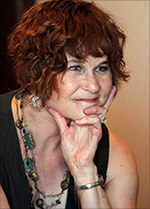LA STAGE TIMES
FIRST PERSON
 A White Crow Flies in Santa Monica
by Dale Griffiths Stamos | April 23, 2013
A White Crow Flies in Santa Monica
by Dale Griffiths Stamos | April 23, 2013
It began with the death of my father. My father was a smart, dry-witted academic, with a complex personality, at once self-assured and self-effacing, funny and melancholic. He had, after 20 years in the military, completed a PhD in Middle Eastern history. Soon after becoming a professor of history, he was appointed head of an extraordinary program called Semester at Sea, a floating university that takes students on an around-the-world journey every semester.
My father and I were very close. As a girl growing up, I remember going for daily walks with him, during which we discussed mundane issues like the philosophy of life. When I reached adulthood, these walks transmuted into bi-monthly lunches where we discussed... yes, the philosophy of life. Did we ever find answers? No. But the joy was in the exploration.
When my father died after an agonizing battle with lung cancer, my sorrow cut bone-deep. I couldn't imagine a world in which my father didn't exist. Two weeks after he died, I wrote a poem, called "The World Tilted." Although it would be years before I would begin writing
One White Crow, looking back at this poem, I realize the germ of the play was there.
In the final lines of the poem, speaking to my Dad, I ask: "And are you now in some place / where our day to dayness / is like a blink, a whisper, a flower you can light upon / with a thought, in a dream, / or in the space next to my shoulder / that longs for your hand? / And can you speak to me from there? / Will you speak to me from there? / So your absence does not feel like such a wrong? / Or like a question / into which all my answers fall.
And those are some of the questions of the play. Is there a place from which the dead speak? Are there people, special people, who can hear them? Or is death a door that slams forever shut on any further chance of survival or communication?
Now, my father was a rationalist and so am I. Though I am drawn to spiritual questions, I try to examine them through the lens of critical thinking. So I could not write this play without presenting both sides of the equation. And thus were born my three characters: Tess, a journalist, daughter of a famous science-writer father who had recently died; Judith, a popular television medium whom Tess has been invited to profile; and Alex, a professional skeptic and former protégé of Tess's father (along with once being Tess's "crush.") Add intrigue, romance and a guilty secret, and the play explores not only the question of life after death, but also loss, how beliefs can govern our lives, and the difficulty of change.
As with most of my plays,
One White Crow went through a lengthy developmental process. I first had a reading (with the title Crossing Over) at Syzygy Theatre, through the auspices of the LA Writers Center, under the direction of the intrepid Che'Rae Adams. Then, working with the current director of the play, Deborah LaVine, who brought her keen dramaturgical skills to the process, I took it through two more rehearsed developmental readings at Edgemar Center for the Arts and at Pacific Resident Theatre.
During the Edgemar reading, we asked Michelle Danner, the artistic director of the theatre, and an accomplished actress and director, to take on the role of the medium, Judith Knight. Inspired by the role and by the play, she decided to bring
One White Crow to Edgemar, where I am thrilled to be seeing its premiere. Along with Michelle's heartfelt Judith, we have the amazing talents of Jane Hajduk as the deeply conflicted Tess and Rob Estes as the quintessential skeptic.
Finally, you may be curious as to the meaning of the title,
One White Crow. This is based on a remark made by the famous 19th century psychologist and philosopher, William James. The skeptic of his day, James debunked many of the spiritual practitioners of the time, revealing the various tricks and sleight-of-hand methods they used to fool people. Then he met Leonora Piper and though he put her through a rigorous examination, he was never able, to his satisfaction, to prove her to be a fake. He ended up saying: "To upset the conclusion that all crows are black, there is no need to seek demonstration that no crows are black; it is sufficient to produce one white crow."
One White Crow asks not only if there is such a thing as a white crow, but what are the implications if there is?
One White Crow, Edgemar Center for the Arts, 2437 Main Street, Santa Monica, 90405. Opens Saturday. Fri-Sat 8 pm, Sun 5 pm. Tickets: $34.99. www.edgemarcenter.org. 310-392-7327.
Dale Griffiths Stamos is a playwright, poet and teacher. Her short and long plays have been produced throughout the United States and abroad, and have garnered such awards as the Heideman award, the Jewel Box Theatre Playwriting Prize, and top-10 winner (twice) of the Writer's Digest Stage Play Competition.
 A White Crow Flies in Santa Monica
A White Crow Flies in Santa Monica